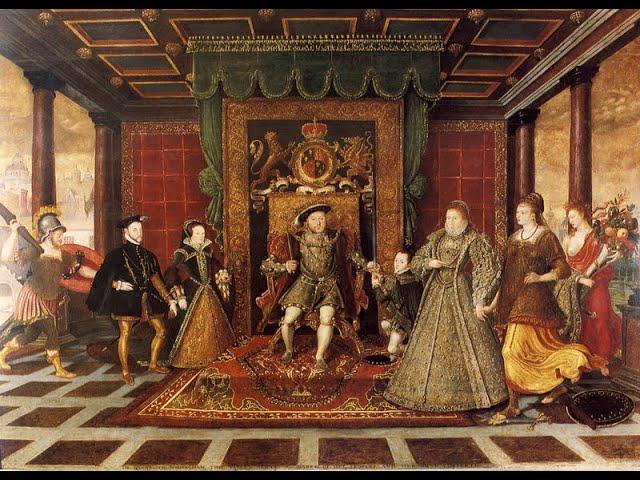
Philip II by William Thomas Walsh | 9/33 Philip, Mary and Elizabeth (1555)
'Philip II' is an historical work written by William Thomas Walsh, published by TAN Books and Publishers, Inc., 1987. All rights acknowledged.
Modest donations are gratefully accepted to support my research costs, enable a higher frequency of broadcasts and improve production values:
https://www.paypal.com/donate/?hosted_button_id=5Y9AE7F4SHHA4
Back cover:
"Philip II by William Thomas Walsh is one of the crucial books for Catholics today and for all who would understand how our world came to its present state. For this monumental life-story, Walsh's greatest book, is far more than the definitive biography of the man considered to have been Europe's most powerful king ever. It is besides a virtual panorama of Christendom in the 16th century, the pivotal century that gave birth to Protestantism - which out of the 15 major heresies that have confronted the Catholic Church, was the first which the Church did not overcome. Not only is Spanish history covered in this fast-paced biographical masterpiece, but also the interrelated events simultaneously developing in England, France and Europe in general, so that the reader comes away with a global view of an entire era and of the forces which the Catholics of that day were facing as the Protestant Revolt, with its seductive rebellion against all authority, both human and divine, was carried from country to country, purposefully destroying the Ancient Faith and the Christian social fabric.
Because Philip's life and rule spanned the better part of the tumultuous 16th century and because Walsh is so well versed in the historical background of this period, Philip II presents an encompassing history of the times and includes fascinating descriptions of many of the most famous people and events of that period, people such as Henry VIII, Catherine of Aragon, Anne Boleyn, Mary Tudor, Elizabeth I, Mary Queen of Scots, Catherine de' Medici, Don Juan, Andrea Doria, William of Orange, William Cecil, the Duke of Guise, the Duke of Alba, the Duke of Parma, Pope Paul IV, Pope St. Pius V, St. Teresa of Avila, St. Ignatius Loyola, St. Francis Borgia and many, many others. Plus, it covers great historical events such as the Sack of Rome, the Great Siege, the Battle of Lepanto, the loss of the Spanish Armada, the rise of Protestantism, and the Council of Trent.
Walsh shows Protestantism to have been a political revolution - complete with political intrigue, rioting, and the burning and desecration of churches and holy places - and in general a full-scale attempt to overthrow the existing Catholic social order. Here Walsh outlines the bloody Huguenot (Protestant) wars in France and the subversive Masonic-Protestant efforts to undermine the unity of Europe - even then still called Christendom. And in the process he shows how Philip ruled his realms by the moral tenets of the Catholic Faith, and how he strove to preserve the Faith and build it up, which led to his re-establishing the Spanish Inquisition, a decision that was to save Spain from Protestantism and spare her the bloody wars of religion that were to devastate Germany especially, but also France, England, Holland, and other countries.
Philip II is not a book of dry historical facts; it is rather history and biography at their very best, pulsating with living people, struggling to achieve their aims... it is nothing short of a fast-moving, panoramic, epochal story of the 16th century. But more, it is also a book that analyses for the reader the meaning of the historical movements emanating from the 16th century - movements which still influence us so profoundly today.
No Catholic with even the slightest interest in knowing his roots and no Catholic who claims even slightly to be read in his Faith can ignore Philip II. Nor can anyone claiming to be educated, especially in matters historical, afford not to read it. For the writings of William Thomas Walsh stand in a category all by themselves - because they give an accurate picture of the glorious contribution of the Catholic Church to our civilisation, a picture that, simply, is found nowhere else."
Modest donations are gratefully accepted to support my research costs, enable a higher frequency of broadcasts and improve production values:
https://www.paypal.com/donate/?hosted_button_id=5Y9AE7F4SHHA4
Back cover:
"Philip II by William Thomas Walsh is one of the crucial books for Catholics today and for all who would understand how our world came to its present state. For this monumental life-story, Walsh's greatest book, is far more than the definitive biography of the man considered to have been Europe's most powerful king ever. It is besides a virtual panorama of Christendom in the 16th century, the pivotal century that gave birth to Protestantism - which out of the 15 major heresies that have confronted the Catholic Church, was the first which the Church did not overcome. Not only is Spanish history covered in this fast-paced biographical masterpiece, but also the interrelated events simultaneously developing in England, France and Europe in general, so that the reader comes away with a global view of an entire era and of the forces which the Catholics of that day were facing as the Protestant Revolt, with its seductive rebellion against all authority, both human and divine, was carried from country to country, purposefully destroying the Ancient Faith and the Christian social fabric.
Because Philip's life and rule spanned the better part of the tumultuous 16th century and because Walsh is so well versed in the historical background of this period, Philip II presents an encompassing history of the times and includes fascinating descriptions of many of the most famous people and events of that period, people such as Henry VIII, Catherine of Aragon, Anne Boleyn, Mary Tudor, Elizabeth I, Mary Queen of Scots, Catherine de' Medici, Don Juan, Andrea Doria, William of Orange, William Cecil, the Duke of Guise, the Duke of Alba, the Duke of Parma, Pope Paul IV, Pope St. Pius V, St. Teresa of Avila, St. Ignatius Loyola, St. Francis Borgia and many, many others. Plus, it covers great historical events such as the Sack of Rome, the Great Siege, the Battle of Lepanto, the loss of the Spanish Armada, the rise of Protestantism, and the Council of Trent.
Walsh shows Protestantism to have been a political revolution - complete with political intrigue, rioting, and the burning and desecration of churches and holy places - and in general a full-scale attempt to overthrow the existing Catholic social order. Here Walsh outlines the bloody Huguenot (Protestant) wars in France and the subversive Masonic-Protestant efforts to undermine the unity of Europe - even then still called Christendom. And in the process he shows how Philip ruled his realms by the moral tenets of the Catholic Faith, and how he strove to preserve the Faith and build it up, which led to his re-establishing the Spanish Inquisition, a decision that was to save Spain from Protestantism and spare her the bloody wars of religion that were to devastate Germany especially, but also France, England, Holland, and other countries.
Philip II is not a book of dry historical facts; it is rather history and biography at their very best, pulsating with living people, struggling to achieve their aims... it is nothing short of a fast-moving, panoramic, epochal story of the 16th century. But more, it is also a book that analyses for the reader the meaning of the historical movements emanating from the 16th century - movements which still influence us so profoundly today.
No Catholic with even the slightest interest in knowing his roots and no Catholic who claims even slightly to be read in his Faith can ignore Philip II. Nor can anyone claiming to be educated, especially in matters historical, afford not to read it. For the writings of William Thomas Walsh stand in a category all by themselves - because they give an accurate picture of the glorious contribution of the Catholic Church to our civilisation, a picture that, simply, is found nowhere else."
Комментарии:
Philip II by William Thomas Walsh | 9/33 Philip, Mary and Elizabeth (1555)
The Two Cities Podcast
Collection Diagrams for Keynote: Tutorial
ImagineLayout
My MF135 by Harley The Traktorman
belbenDE
LOWER YOUR STANDARDS
The Mindset Mentor Podcast
The Suicide of Europe - 1/3 The Church and Europe before the First World War
The Two Cities Podcast
Deborah Epizòd 9
Tonton Dezirab Komedyen #1
Download GIS Shapefile Data ( Road, Structure etc.) for Any Country: osm to shapefile
Explore RS & GIS Tutorials
zip and edward
Poomnation








![How to download any shapefile map [For City or Country] How to download any shapefile map [For City or Country]](https://ruvideo.cc/img/upload/OGRNM0xPZ011bHg.jpg)


